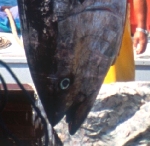In 2010 the fishing industry exceeded its quota of eastern Atlantic bluefin tuna (Thunnus thynnus) by 141 percent, according to a new analysis by Pew Environment Group. The analysis depends on official data, thereby leaving out the massive black market on Atlantic bluefin tuna.
Decades of overfishing has pushed the Atlantic bluefin onto the Critically Endangered list, as kept by the IUCN Red List; yet management of the fish by the International Commission for the Conservation of Atlantic Tunas (ICCAT) has been overrun with corruption and lackluster regulations. According to Pew, new measures adopted by ICCAT—including a lowered quota and a paper documentation system—have clearly not been enough to keep the fishing industry from steamrolling over the 2010 quota.
The environmental group suggests ICCAT should drop paper documentation for electronic.
“An electronic system would provide more-accurate information that can be easily shared and cross-checked instantly. Such a program should also include a physical bar code for each bluefin, which could be easily administered and not be cost prohibitive. This would allow the fish to be tracked from sea to plate,” explains Lee Crockett, director of Atlantic bluefin tuna conservation at Pew, in a press release.
In 2009, scientists with ICCAT recommended a total moratorium on Atlantic bluefin fishing, given the species biomass has dropped to less than 15 percent of its historical biomass before industrial fishing. However, instead of heeding the recommendations of ICCAT researchers, the group set a quota of 13,500 tons. The Convention on International Trade in Endangered Species (CITES) also failed to protect Atlantic bluefin in 2010 after heavy lobbying by Japan.
Atlantic bluefin tuna is primarily sold in Japan for premium sushi. It is a lucrative business: estimated at 7.2 billion US dollars a year. A single fish can sometimes sell for over 100,000 US dollars at the Tokyo Market.
Related articles
Bluefin tuna gets record price ($396,000) at Japanese auction
(01/06/2011) On Tuesday, a 752-pound Pacific bluefin tuna was sold at Japanese auction for the highest price ever received for raw seafood – $396,000. The price tops the previous record by more than $100,000 and comes at a time when tuna populations around the world are experiencing precipitous declines.
Fisheries commissions’ ability to manage diminishing tuna stocks called into question
(12/31/2010) During a meeting earlier this month, the Western and Central Pacific Fisheries Commission (WCPFC) disregarded appeals from the EU and Japan, as well as from Commission scientists, calling for a substantial and immediate reduction in catch rates of bigeye and yellowfin tuna in response to diminished stocks. An earlier meeting of the International Commission for the Conservation of Atlantic Tunas (ICCAT) resulted in only cosmetic cuts to Atlantic bluefin quotas, calling into question the ability of the global system of Regional Fisheries Management Organizations (RFMOs) to prevent overfishing.
History repeats itself: the path to extinction is still paved with greed and waste

(04/05/2010) As a child I read about the near-extinction of the American bison. Once the dominant species on America’s Great Plains, I remember books illustrating how train-travelers would set their guns on open windows and shoot down bison by the hundreds as the locomotive sped through what was left of the wild west. The American bison plunged from an estimated 30 million to a few hundred at the opening of the 20th century. When I read about the bison’s demise I remember thinking, with the characteristic superiority of a child, how such a thing could never happen today, that society has, in a word, ‘progressed’. Grown-up now, the world has made me wiser: last month the international organization CITES (Convention on International Trade in Endangered Species) struck down a ban on the Critically Endangered Atlantic bluefin tuna. The story of the Atlantic bluefin tuna is a long and mostly irrational one—that is if one looks at the Atlantic bluefin from a scientific, ecologic, moral, or common-sense perspective.














